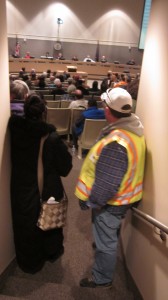
The Anchorage Assembly heard from the public on an ordinance that would change the way public testimony conducted, last night. Despite the issue being placed at the end of the agenda and testimony beginning after 9 p.m., many lined up to speak.
Ernie Hall made the proposal after a controversial ordinance that sought to limit unions resulted in what he perceived as several endless nights of public testimony. Eventually the Assembly voted to close testimony before everyone had a chance to speak. Sabrina Martino said she liked the way testimony was conducted during the consideration of AO37 and that she felt the new ordinance would discourage public participation in city politics.
“I kind of think that this is almost like a rebuttal for the attendance shown for Anchorage Ordinance 37 as if maybe you are trying to maybe discourage people from actually coming and speaking your two sense,” Martino said. “And that is almost like you guys are making up your own rules and don’t want to hear what anybody has to say and I don’t agree with that.”
The ordinance would require people to sign up in person on the first night of the hearing in order to testify. Tom Stenson from the ACLU of Alaska said, what’s important is that the Assembly come up with firm, objective standards to make sure that testimony is conducted fairly and legally.
“I’m not claiming to read anybody’s minds, but I think one of the problems that has arisen is that the public fears that when testimony is cut off on an ad hoc basis that it may be influenced by the chair’s view of whether the speech that’s being made is good or not,” Stenson said. “And that kind of viewpoint discrimination is clearly not permitted. And so what we need are clear standards.”
Hall worked with the ACLU to craft the ordinance. He expressed surprise at Stenson’s criticisms. Public Testimony is expected to be continued at the next regular Assembly meeting on May 21.
Daysha Eaton is a contributor with the Alaska Public Radio Network.
Daysha Eaton holds a B.A. from Evergreen State College, and a M.A. from the University of Southern California. Daysha got her start in radio at Seattle public radio stations, KPLU and KUOW. Before coming to KBBI, she was the News Director at KYUK in Bethel. She has also worked as the Southcentral Reporter for KSKA in Anchorage.
Daysha's work has appeared on NPR's "Morning Edition" and "All Things Considered", PRI's "The World" and "National Native News". She's happy to take assignments, and to get news tips, which are best sent via email.
Daysha became a journalist because she believes in the power of storytelling. Stories connect us and they help us make sense of our world. They shed light on injustice and they comfort us in troubled times. She got into public broadcasting because it seems to fulfill the intention of the 4th Estate and to most effectively apply the freedom of the press granted to us through the Constitution. She feels that public radio has a special way of moving people emotionally through sound, taking them to remote places, introducing them to people they would not otherwise meet and compelling them to think about issues they might ordinarily overlook.




